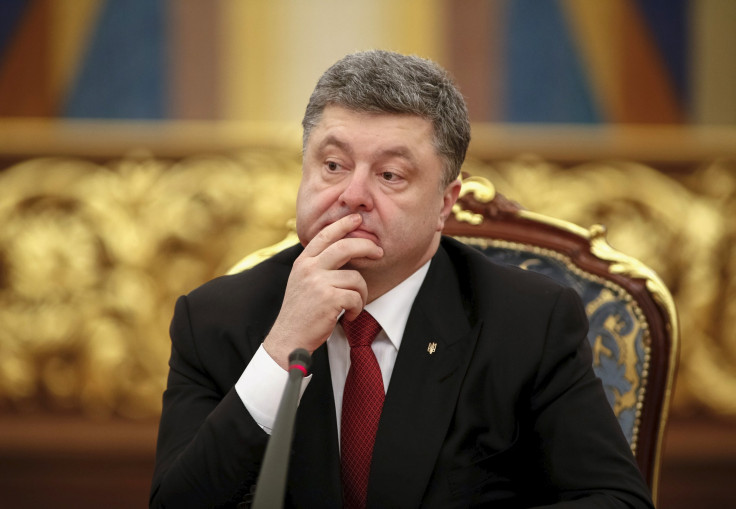Ukraine's Controversial Bill Recognizing WWII-Era Partisans Draws Harsh Criticism From Russians

Ukraine’s President Petro Poroshenko was greeted by a group of pro-Russian Ukrainians chanting “Murderer!” and “No to fascism!” in Odessa Friday, a day after his bloc in parliament passed a bill recognizing controversial World War II-era partisan groups as so-called freedom fighters, according to the TASS Russia News Agency. The groups are revered by some in Ukraine because they defended ethnic Ukrainians in the chaos of World War II, but many pro-Russian Ukrainians consider them terrorists who willingly collaborated with Nazi Germany to fight the Soviet Union.
Labeled “On the Legal Status and Honoring of Fighters for Ukraine’s Independence in the Twentieth Century,” the bill was one of several centered on the country’s troubled history in the 20th century that were OK’d by parliament Thursday. One of the other bills would open up the archives of the Ukrainian wing of the KGB, the Soviet-era intelligence service, and another of them would ban the display of both Nazi and Soviet imagery in the nation.
Poroshenko has yet to sign any of the three bills into law, but they’re already drawing criticism from pro-Russian separatist leaders, Russian politicians and their supporters on social media. The bill recognizing Ukraine’s nationalist partisans, many of whom fought against both Nazi and Soviet occupiers during World War II and the postwar years, has attracted the biggest backlash.
The bill would recognize groups such as the Ukrainian Insurgent Army (UPA) and Stepan Bandera’s so-called Banderite as legitimate combatants in World War II and as freedom fighters who fought for Ukrainian independence. Some of those partisan groups are believed to have participated in the ethnic cleansing of Poles in Ukraine, as well as the carrying out of bombings and kidnappings against the country’s postwar Soviet government. If the bill were to become law, it would grant veterans of these groups social benefits and make them eligible for state awards. It would also make it illegal to deny the legitimacy of their actions, according to UAPosition, a Ukraine-centered media site.
Ukraine’s current nationalist elements such as the Right Sector strongly identify with Bandera and his fellow partisans, who they say laid the foundation for Ukrainian nationalism. While most far-right Ukrainain groups are fragmented and remain largely on the fringe of Ukrainian politics, the Right Sector was visible in the Euromaidan movement, and it participated in a handful of volunteer paramilitary brigades that played decisive roles in Ukraine’s fight against pro-Russian separatists in southeastern Ukraine during the past year. Critics of the Euromaidan movement alleged the nationalist presence was indicative of the fascist, anti-Russian principles of the movement and the pro-European government that came into power as a result of it.
“Anything that enhances the reputation of these groups, from which most of Ukraine’s modern nationalist groups have sought inspiration, just gives greater weight to the Russian argument that [the Ukrainian government] is a bunch of Nazis, terrorists or what have you,” said Melvyn Levitsky, a former U.S. diplomat and a professor of international policy and practice at the University of Michigan’s Gerald R. Ford School of Public Policy.
The parliamentary action came as hostilities between the government in Kiev and pro-Russian rebels in eastern Ukraine are in the midst of a lull, albeit not entirely over. A February ceasefire agreement has largely held in the east, rhetoric on both sides has diminished in volume, and the inflammatory comments that have emerged haven’t led to a significant increase in violence.
However, the controversial measure plays directly into the fear among Ukraine’s ethnic Russians that the Poroshenko government is fascist in nature. Inflamed by Russian state media, that fear was a major contributor to the escalation of the war in Ukraine.
Russian media this week seized on the passage of the bill as proof this fear was well-founded. A Russian senator declared Friday that a law recognizing the freedom fighters would give pro-Russian separatists the right to fight for freedom, as well, Tass reported. The leader of the so-called Donetsk People’s Republic, Alexander Zakharchenko, ominously predicted the law would further alienate ethnic Russians and Ukrainians from each other and even “lead to a complete breakup of the country.”
The bill is the first piece of legislation to attempt to recognize 20th century partisan groups. Ukrainian lawmakers have debated the topic in the past, but no bill was previously passed. Considering that hostilities in the east are at their lowest levels since the beginning of fighting in March of last year, the timing of the bill is questionable, said Levitsky, who argued it wasn’t necessary to recognize those partisan groups.
“Are they poking the Russian bear in the eyes a little bit? Maybe, is it an effort to breed some Ukrainian nationalism? To me, it doesn’t make sense to put it out in such a visible way,” he said.
© Copyright IBTimes 2024. All rights reserved.





















